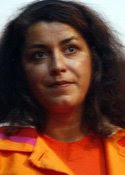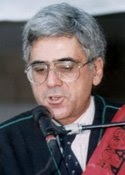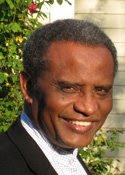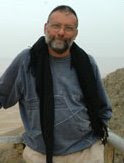Each year, K.U.Leuven confers honorary doctorates on persons of  exceptional scientific, social or cultural merit. Now both K.U.Leuven and UCL (Louvain-la-Neuve) have decided to celebrate their Patron’s Feast (Holy Mary, Mother of Jezus) together in 2009 and to jointly confer the distinctions. In this way, they wish to stress their intention to strengthen the collaboration with their sister university. As a result, four eminent persons will receive the title of doctor honoris causa from K.U.Leuven and UCL on 2 February 2009. The Academic Boards of the two institutions have chosen the theme ‘multiculturality, interculturality and diversity’.
exceptional scientific, social or cultural merit. Now both K.U.Leuven and UCL (Louvain-la-Neuve) have decided to celebrate their Patron’s Feast (Holy Mary, Mother of Jezus) together in 2009 and to jointly confer the distinctions. In this way, they wish to stress their intention to strengthen the collaboration with their sister university. As a result, four eminent persons will receive the title of doctor honoris causa from K.U.Leuven and UCL on 2 February 2009. The Academic Boards of the two institutions have chosen the theme ‘multiculturality, interculturality and diversity’.
 exceptional scientific, social or cultural merit. Now both K.U.Leuven and UCL (Louvain-la-Neuve) have decided to celebrate their Patron’s Feast (Holy Mary, Mother of Jezus) together in 2009 and to jointly confer the distinctions. In this way, they wish to stress their intention to strengthen the collaboration with their sister university. As a result, four eminent persons will receive the title of doctor honoris causa from K.U.Leuven and UCL on 2 February 2009. The Academic Boards of the two institutions have chosen the theme ‘multiculturality, interculturality and diversity’.
exceptional scientific, social or cultural merit. Now both K.U.Leuven and UCL (Louvain-la-Neuve) have decided to celebrate their Patron’s Feast (Holy Mary, Mother of Jezus) together in 2009 and to jointly confer the distinctions. In this way, they wish to stress their intention to strengthen the collaboration with their sister university. As a result, four eminent persons will receive the title of doctor honoris causa from K.U.Leuven and UCL on 2 February 2009. The Academic Boards of the two institutions have chosen the theme ‘multiculturality, interculturality and diversity’.
Marjane Satrapi (Teheran, 1969) is an illustrator and graphic novelist.  She won over the hearts of the public with her graphic novel Persepolis. In this autobiographical work, made into a film in 2007, she describes the different periods of the Iranian revolution, seen through the eyes of a young girl. In a critical but humorous manner she uses the book to educate Western readers about Iran, arousing interest in and empathy for the country and its people. At the same time, she debunks many of the myths about the Iranians and their culture. Marjane Satrapi now lives in France. Promoter: Mr Thierry Bellefroid, journalist associated with UCL.
She won over the hearts of the public with her graphic novel Persepolis. In this autobiographical work, made into a film in 2007, she describes the different periods of the Iranian revolution, seen through the eyes of a young girl. In a critical but humorous manner she uses the book to educate Western readers about Iran, arousing interest in and empathy for the country and its people. At the same time, she debunks many of the myths about the Iranians and their culture. Marjane Satrapi now lives in France. Promoter: Mr Thierry Bellefroid, journalist associated with UCL.
 She won over the hearts of the public with her graphic novel Persepolis. In this autobiographical work, made into a film in 2007, she describes the different periods of the Iranian revolution, seen through the eyes of a young girl. In a critical but humorous manner she uses the book to educate Western readers about Iran, arousing interest in and empathy for the country and its people. At the same time, she debunks many of the myths about the Iranians and their culture. Marjane Satrapi now lives in France. Promoter: Mr Thierry Bellefroid, journalist associated with UCL.
She won over the hearts of the public with her graphic novel Persepolis. In this autobiographical work, made into a film in 2007, she describes the different periods of the Iranian revolution, seen through the eyes of a young girl. In a critical but humorous manner she uses the book to educate Western readers about Iran, arousing interest in and empathy for the country and its people. At the same time, she debunks many of the myths about the Iranians and their culture. Marjane Satrapi now lives in France. Promoter: Mr Thierry Bellefroid, journalist associated with UCL.
Prof. Sari Nusseibeh (Damascus, 1949) is rector of Al-Quds University  in Jerusalem. He is known for his views on peace and dialogue in the Israeli-Palestinian conflict. Together with the Israeli politician Ami Ayalon, Sari Nusseibeh is co-author of the declaration The People’s Voice. On the principle of ‘two people, two states’, the authors call for a Palestinian state based on Israel’s 1967 frontiers and for a compromise about the Palestinian right to return. The aim of the declaration is to build up grass-roots support for a solution to the conflict. Promoter: Prof. Helge Daniëls, Near Eastern Studies Unit.
in Jerusalem. He is known for his views on peace and dialogue in the Israeli-Palestinian conflict. Together with the Israeli politician Ami Ayalon, Sari Nusseibeh is co-author of the declaration The People’s Voice. On the principle of ‘two people, two states’, the authors call for a Palestinian state based on Israel’s 1967 frontiers and for a compromise about the Palestinian right to return. The aim of the declaration is to build up grass-roots support for a solution to the conflict. Promoter: Prof. Helge Daniëls, Near Eastern Studies Unit.
 in Jerusalem. He is known for his views on peace and dialogue in the Israeli-Palestinian conflict. Together with the Israeli politician Ami Ayalon, Sari Nusseibeh is co-author of the declaration The People’s Voice. On the principle of ‘two people, two states’, the authors call for a Palestinian state based on Israel’s 1967 frontiers and for a compromise about the Palestinian right to return. The aim of the declaration is to build up grass-roots support for a solution to the conflict. Promoter: Prof. Helge Daniëls, Near Eastern Studies Unit.
in Jerusalem. He is known for his views on peace and dialogue in the Israeli-Palestinian conflict. Together with the Israeli politician Ami Ayalon, Sari Nusseibeh is co-author of the declaration The People’s Voice. On the principle of ‘two people, two states’, the authors call for a Palestinian state based on Israel’s 1967 frontiers and for a compromise about the Palestinian right to return. The aim of the declaration is to build up grass-roots support for a solution to the conflict. Promoter: Prof. Helge Daniëls, Near Eastern Studies Unit.
Prof. Abdullahi Ahmed An-Na‘im (Sudan, 1950) is professor at the  School of Law of Emory University in Atlanta. Between 1993 and 1995, he was director-general of the African department of Human Rights Watch. Abdullahi Ahmed An-Na‘im is regarded as one of the leading experts on human rights in Islam. He rejects the idea that Islam and human rights are incompatible, and defends the position that the Muslim identity can be integrated with universal human rights. In workshops on human rights, he has introduced people to the principles of human rights in various African and Arab countries. His starting point is that human rights cannot be imposed from above with laws and formal rules if they are not supported from the bottom up by less educated people. In a recent work, he examines the possibilities for reconciling Islam with the demands of the secular state. Here too, he attempts to build bridges between what are regarded by some as conflicting viewpoints on how human societies should be organised. Promoter: Prof. Marie-Claire Foblets, Institute for Foreigners Law and Anthropology of Law
School of Law of Emory University in Atlanta. Between 1993 and 1995, he was director-general of the African department of Human Rights Watch. Abdullahi Ahmed An-Na‘im is regarded as one of the leading experts on human rights in Islam. He rejects the idea that Islam and human rights are incompatible, and defends the position that the Muslim identity can be integrated with universal human rights. In workshops on human rights, he has introduced people to the principles of human rights in various African and Arab countries. His starting point is that human rights cannot be imposed from above with laws and formal rules if they are not supported from the bottom up by less educated people. In a recent work, he examines the possibilities for reconciling Islam with the demands of the secular state. Here too, he attempts to build bridges between what are regarded by some as conflicting viewpoints on how human societies should be organised. Promoter: Prof. Marie-Claire Foblets, Institute for Foreigners Law and Anthropology of Law
 School of Law of Emory University in Atlanta. Between 1993 and 1995, he was director-general of the African department of Human Rights Watch. Abdullahi Ahmed An-Na‘im is regarded as one of the leading experts on human rights in Islam. He rejects the idea that Islam and human rights are incompatible, and defends the position that the Muslim identity can be integrated with universal human rights. In workshops on human rights, he has introduced people to the principles of human rights in various African and Arab countries. His starting point is that human rights cannot be imposed from above with laws and formal rules if they are not supported from the bottom up by less educated people. In a recent work, he examines the possibilities for reconciling Islam with the demands of the secular state. Here too, he attempts to build bridges between what are regarded by some as conflicting viewpoints on how human societies should be organised. Promoter: Prof. Marie-Claire Foblets, Institute for Foreigners Law and Anthropology of Law
School of Law of Emory University in Atlanta. Between 1993 and 1995, he was director-general of the African department of Human Rights Watch. Abdullahi Ahmed An-Na‘im is regarded as one of the leading experts on human rights in Islam. He rejects the idea that Islam and human rights are incompatible, and defends the position that the Muslim identity can be integrated with universal human rights. In workshops on human rights, he has introduced people to the principles of human rights in various African and Arab countries. His starting point is that human rights cannot be imposed from above with laws and formal rules if they are not supported from the bottom up by less educated people. In a recent work, he examines the possibilities for reconciling Islam with the demands of the secular state. Here too, he attempts to build bridges between what are regarded by some as conflicting viewpoints on how human societies should be organised. Promoter: Prof. Marie-Claire Foblets, Institute for Foreigners Law and Anthropology of LawPaolo Dall’Oglio (Rome, 1954) is an Italian Jesuit who cares deeply
 about faith, justice and truth. In 1992, he founded a mixed ecumenical religious community in the monastery of Mar Musa el-Habashi to the north of Damascus, which had been abandoned for centuries. The monastery of ‘Saint Moses’, Mar Musa in Arabic, is renowned for its hospitality and its involvement in dialogue with the Muslims. The community aspires to bring about a positive relationship between Islam and Christianity. The choice of Arabic as the language for everyday use and for the liturgical life of this ecumenical and international community is closely bound up with this purpose. Promoters: Mr Benjamin Peltier and Mr Dries Deweer, students at UCL and K.U.Leuven
about faith, justice and truth. In 1992, he founded a mixed ecumenical religious community in the monastery of Mar Musa el-Habashi to the north of Damascus, which had been abandoned for centuries. The monastery of ‘Saint Moses’, Mar Musa in Arabic, is renowned for its hospitality and its involvement in dialogue with the Muslims. The community aspires to bring about a positive relationship between Islam and Christianity. The choice of Arabic as the language for everyday use and for the liturgical life of this ecumenical and international community is closely bound up with this purpose. Promoters: Mr Benjamin Peltier and Mr Dries Deweer, students at UCL and K.U.Leuven






